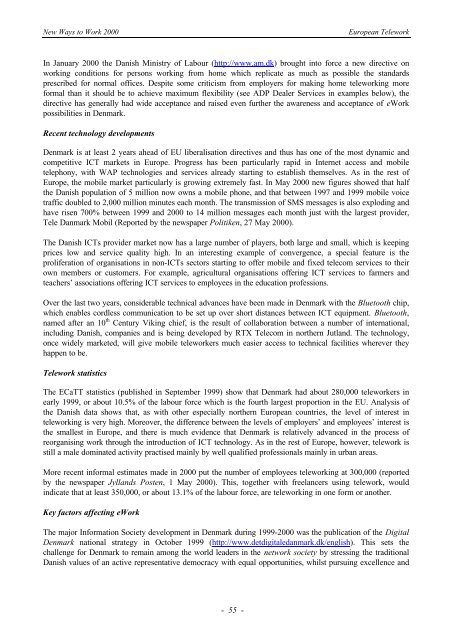eWORK 2000 - European Telework Week
eWORK 2000 - European Telework Week
eWORK 2000 - European Telework Week
- No tags were found...
You also want an ePaper? Increase the reach of your titles
YUMPU automatically turns print PDFs into web optimized ePapers that Google loves.
New Ways to Work <strong>2000</strong><strong>European</strong> <strong>Telework</strong>In January <strong>2000</strong> the Danish Ministry of Labour (http://www.am.dk) brought into force a new directive onworking conditions for persons working from home which replicate as much as possible the standardsprescribed for normal offices. Despite some criticism from employers for making home teleworking moreformal than it should be to achieve maximum flexibility (see ADP Dealer Services in examples below), thedirective has generally had wide acceptance and raised even further the awareness and acceptance of eWorkpossibilities in Denmark.Recent technology developmentsDenmark is at least 2 years ahead of EU liberalisation directives and thus has one of the most dynamic andcompetitive ICT markets in Europe. Progress has been particularly rapid in Internet access and mobiletelephony, with WAP technologies and services already starting to establish themselves. As in the rest ofEurope, the mobile market particularly is growing extremely fast. In May <strong>2000</strong> new figures showed that halfthe Danish population of 5 million now owns a mobile phone, and that between 1997 and 1999 mobile voicetraffic doubled to 2,000 million minutes each month. The transmission of SMS messages is also exploding andhave risen 700% between 1999 and <strong>2000</strong> to 14 million messages each month just with the largest provider,Tele Danmark Mobil (Reported by the newspaper Politiken, 27 May <strong>2000</strong>).The Danish ICTs provider market now has a large number of players, both large and small, which is keepingprices low and service quality high. In an interesting example of convergence, a special feature is theproliferation of organisations in non-ICTs sectors starting to offer mobile and fixed telecom services to theirown members or customers. For example, agricultural organisations offering ICT services to farmers andteachers’ associations offering ICT services to employees in the education professions.Over the last two years, considerable technical advances have been made in Denmark with the Bluetooth chip,which enables cordless communication to be set up over short distances between ICT equipment. Bluetooth,named after an 10 th Century Viking chief, is the result of collaboration between a number of international,including Danish, companies and is being developed by RTX Telecom in northern Jutland. The technology,once widely marketed, will give mobile teleworkers much easier access to technical facilities wherever theyhappen to be.<strong>Telework</strong> statisticsThe ECaTT statistics (published in September 1999) show that Denmark had about 280,000 teleworkers inearly 1999, or about 10.5% of the labour force which is the fourth largest proportion in the EU. Analysis ofthe Danish data shows that, as with other especially northern <strong>European</strong> countries, the level of interest inteleworking is very high. Moreover, the difference between the levels of employers’ and employees’ interest isthe smallest in Europe, and there is much evidence that Denmark is relatively advanced in the process ofreorganising work through the introduction of ICT technology. As in the rest of Europe, however, telework isstill a male dominated activity practised mainly by well qualified professionals mainly in urban areas.More recent informal estimates made in <strong>2000</strong> put the number of employees teleworking at 300,000 (reportedby the newspaper Jyllands Posten, 1 May <strong>2000</strong>). This, together with freelancers using telework, wouldindicate that at least 350,000, or about 13.1% of the labour force, are teleworking in one form or another.Key factors affecting eWorkThe major Information Society development in Denmark during 1999-<strong>2000</strong> was the publication of the DigitalDenmark national strategy in October 1999 (http://www.detdigitaledanmark.dk/english). This sets thechallenge for Denmark to remain among the world leaders in the network society by stressing the traditionalDanish values of an active representative democracy with equal opportunities, whilst pursuing excellence and- 55 -








